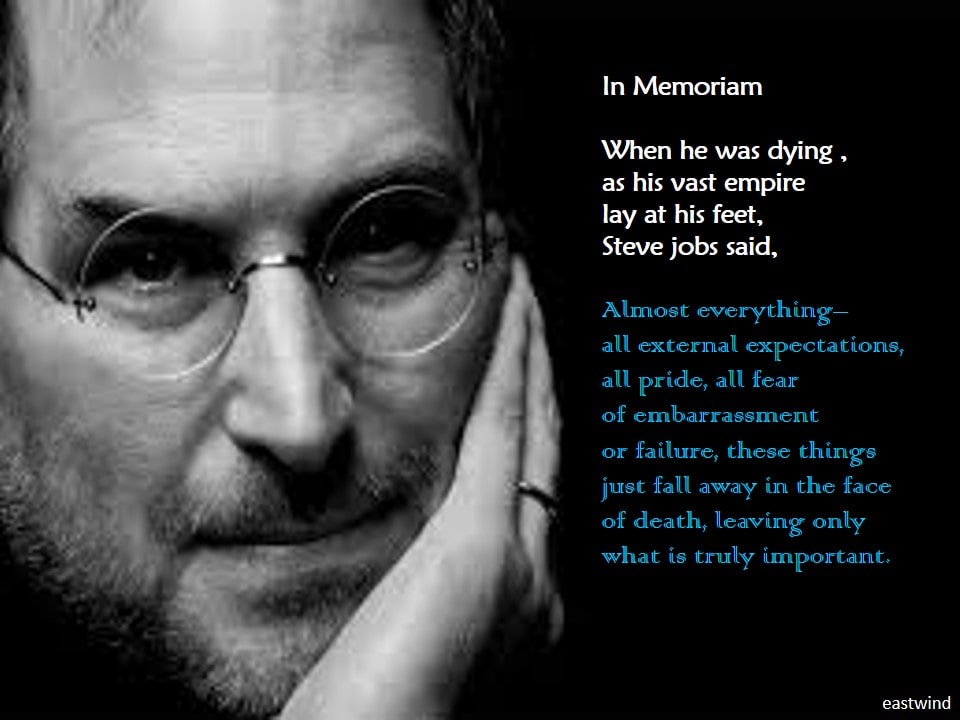Inspirational
Steve Jobs – Death as the Principle of Life


Steve Jobs discovered later that his cancer was a rare curable one. The nearness of death vanished just as quickly as it emerged. But the effect on Steve was so profound that this did not change his paradigm shift. He realized that death must be the principle of life. The way we live must be dictated by the thought of death. Life is but a fleeting moment. There is no time to dilly-dally. One must do what he needs to do at once. Go for the jugular.
As a guest speaker at the graduation of Reed College in Portland, Oregon, he said, “If today was the last day of my life, would I want to do what I am about to do? You are already naked. There is no reason not to follow your heart.” Only then did Steve realize that, at the thought of death, he had ‘nothing to lose’, which gave him courage – wings to weather any storm; throw caution to the wind.
The nearness of death helped Steve sift through what was meaningful and absurd in life. He said, “Death is the destination we all share. No one escapes it. Death is the single best invention of life. So, don’t waste it living someone else’s life. Don’t be trapped by dogma, which is living with the results of other people’s thinking. Don’t let the noise of other people’s opinions drown out your own inner voice. Have the courage to follow your heart and intuition.”
Connecting the Dots
Steve never graduated from college. Her mother was a young graduate student who put him up for adoption. At age 17, Steve chose Reed College, a very expensive school. His adoptive parents had to spend all their savings on Steve’s tuition. After 6 months, however, he dropped out. He said, “It was one of the best decisions I ever made.” He dropped out of the uninteresting subjects and ‘dropped in’ only on the interesting ones.
One subject that fascinated him is Calligraphy, although he did not know how it would help his career in the future. It had no practical application in his life then. He realized years later that it was an important part of the software he would generate needing the study of fonts and creative typography. He said that Windows eventually copied Apple’s typography as he designed it.
It was serendipity, stumbling ‘accidentally’ on precious things, that was an important part of Steve’s destiny. Ten years later, he realized he was ‘connecting the dots’ by accident. It all came back to him when he was designing the MacIntosh computer. He said, “If I had never dropped out, I would never have dropped in that Calligraphy class.”
Without knowing it, Steve became a pioneer of ‘selective education’, a new trend being experimented with by a few pioneering universities today. Universities offer a flood of courses dumped on students, half of which are irrelevant to their lives. It took a rebel to defy the system. The focus was the key to Steve’s learning style. He said, “Believing that the dots will connect down the road will give you the confidence to follow your heart even if it leads you off the well-worn path.”
Loving and Losing
In ten years, Apple grew from a partnership in a garage to a two billion firm with 4,000 employees. Ironically, Steve was fired from the very company he started, which shocked everyone. The Apple board which threw him out was a bunch of Harvard-Yale-Oxford-cultured bright boys who could not understand the vision of a college drop-out.
“I’ve been rejected but I was still ‘in love’ (with what he had done). And so I decided to start over. I didn’t see it then, but getting fired by Apple was the best thing that ever happened to me.” It was serendipity all over again.
In the next 5 years, Steve founded Pixar, a pioneer firm in computer animation that quickly soared to the stratosphere. At that time, Apple went ironically bankrupt in the hands of the bright boys. They took Steve in again, who resurrected Apple back into stardom by launching iPod, one of the most powerful communication innovations of the century.
Steve said, “Sometimes, life is going to hit you with a brick on the face. Don’t lose faith. The only way to do great work is to love what you do.” Indeed, loving saved Steve from losing.
‘Love Marketing’
Steve Jobs, the rebel entrepreneur dropout who defied ivy league education, invented a new radical approach to marketing. The traditional business tenet was profit, the ‘god of business’. Steve fought against that tenet, saying the customer is the ultimate ‘god of business’, prior to even profit. He simply said love your customer and everything falls into place. Go for the heart and the pocket will follow.
The lesson is spiritual more than entrepreneurial – the primacy of love over profit in a landscape of a vicious amoral Machiavellian jungle of corporations.
































